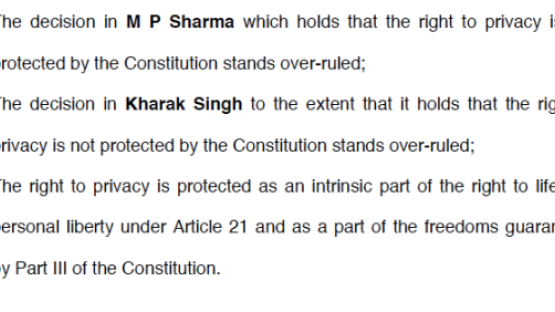1.3 Billion People’s Right To Privacy Upheld Following Historic Judgement By India’s Supreme Court

The Supreme Court has ruled that there is a fundamental right to privacy under the Indian constitution, establishing that “The right to privacy is protected as an intrinsic part of the right to life and personal liberty”. This was a unanimous ruling by a bench of nine supreme court justices, who heard the case following a decision in 2015 over whether the controversial Aadhaar biometric identity scheme was constitutional.
The judgment is clear: privacy and human dignity are intrinsically linked. “Privacy ensures that a human being can lead a life of dignity by securing the inner recesses of the human personality from unwanted intrusion. Privacy recognises the autonomy of the individual and the right of every person to make essential choices which affect the course of life. In doing so privacy recognises that living a life of dignity is essential for a human being to fulfil the liberties and freedoms which are the cornerstone of the Constitution.”
Getting to this point has not been easy. A decade ago, there was resistance from many fronts about the right to privacy in India. The conventional wisdom was that privacy was a privilege for the rich and few, and that the vast majority of the population had other concerns. This is an argument that Privacy International hears from all over the world, which was repeated in the government’s presentation to the Supreme Court. But it was rejected, in the strongest possible terms, by the Indian justices:
“Every individual in society irrespective of social class or economic status is entitled to the intimacy and autonomy which privacy protects. The pursuit of happiness is founded upon autonomy and dignity. Both are essential attributes of privacy which makes no distinction between the birth marks of individuals.”
As a result of the collective effort of many, including activists, NGOs, and academics, positive developments began to emerge. Through a privacy lens, research and awareness-raising was undertaken to challenge the use of new technologies. Groups like our partners, the Centre for Internet and Society, have researched extensively, enabled and contributed to the discussion on the contours of the right to privacy in the Indian context. They have shown that change is possible.
This is not the end, as the meaning and implications of this ruling won’t become fully clear for years and decades to come. Moreover, the judges have argued that there must be data protection that protects the autonomy of the individual. It is essential that civil society plays its role in ensuring that the legislation proposed by the government meets these standards.
The judgment unlocks the possiblity of challenging laws and practices ranging from discrimination to lack of adequate data protection, from unlawful surveillance to data profiling and harvesting of personal data by companies. Ultimately, this is a time to celebrate, not only because 1.3 billion people have today had their right to privacy strengthened and recognised. It is also to be celebrated because it shows that the voice of the public has the ability to influence and shape a democratic society.
This victory — unimaginable a decade ago — shows us all that these fights are worth fighting. We must sustain our efforts to ensure that there is a real transformation to ensure that the right to privacy is upheld, respected and promoted for all.
Read the full judgment here.



